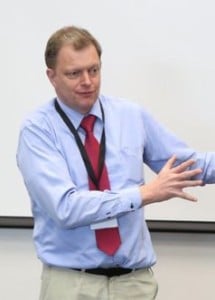The first annual STIAS-Wallenberg Round Table Meeting is scheduled to take place at the STIAS-Wallenberg Research Centre in Stellenbosch on 7 and 8 March 2013.
The theme for this year’s Round Table Meeting is: Investment and technology choices in the SA power sector: Economic, social and environmental trade-offs.
The Marianne and Marcus Wallenberg Foundation, key funders of the STIAS programme, is supporting an annual round table forum where representatives from South Africa, Sweden and a broader international community will engage in dialogue and debate around a central theme, typically one related to current global challenges, and in particular focusing on its local manifestation.
For 2013 the Round Table Meeting will focus on the broad energy and electricity landscape in Southern Africa. The Round Table Meeting will be preceded by a three day planning workshop of a more technical nature (from 4 to 6 March 2013 at the same venue).
People
The Wallenberg Foundation tasked Ms Maud Olofsson to assist STIAS in developing strategies for the round table forums. Her involvement as Sweden’s former Minister of Energy equipped her with a wealth of experience and a network of international contacts which are especially valuable with regard to the focus on energy and electricity in the first STIAS Round Table.
Members of the local organising group include professor Anton Eberhard from the University of Cape Town’s Graduate Business School and member of the National Planning Commission; professor Wikus van Niekerk, Director of the Centre for Renewable and Sustainable Energy Studies at Stellenbosch University; and Mr Saliem Fakir, Head of the Living Planet Unit at the World Wildlife Fund.
Among the confirmed international participants in the programme are Thomas B Johansson, Co-Chair of the Global Energy Assessment, IIASA, and professor at Lund University; Tomas Kåberger, former Director General of the Swedish Energy Agency and Chairman of the Japan renewable energy foundation; Andreas Carlgren, former Minister for the Environment in the Swedish government; Patrick Dewilde, Director of the Technische Universität München Institute for Advanced Study (TUM-IAS); Ulrich Stimming, Co-Director of the Joint “Institute for Advanced Power Sources” (IAPS) of TUM and Tsinghua University (Beijing, China); and Peter A Wilderer, Former Chair of Water Quality and Waste Technology at TUM and member of the International Expert Group on Earth System Preservation.
Strategy
Currently the broad strategy is to structure the workshop as a platform for a more technical discussion of the issues on which the latest research developments could have a bearing. The outcomes of such discussions will then be used to inform the Round Table Meeting. The Round Table Meeting is intended to use state of the art research findings to discuss options in a wider forum, involving actors from the public, private as well as civil society sectors.
Programme brief
Participants are tasked to take South Africa’s Integrated Resource Plan 2010–2030 as point of departure. The IRP was written in 2010 and may therefore already be dated in certain respects, due to changes in demand, prices, technologies and resources available, natural as well as financial, etc. The assumptions underlying the IRP2010 therefore need to be interrogated continuously and constructively. In 2012 the SA government accepted the National Development Plan that will guide policy formation up to 2030. Its Chapters 4 and 5 essentially define the policy parameters for energy infrastructure and environmental affairs that will have to be taken into account in any new power plan for SA.
These two official reports form the “book-ends” which “frame” the Workshop and Roundtable. The envisaged outcome is to define the requirements and contours of a new power plan for South Africa, taking into account the global trends in energy and related technological developments and the inevitable trade-offs that will affect local economic, social and environmental outcomes.
Among others, the needs for future research will become clear, and possibly the need for a permanent independent institution to inform energy policy in the country and the region.
Enquiries regarding the Round Table Meeting should be addressed to Johann Groenewald, e-mail: jpg[at]sun[dot]ac[dot]za.
For a draft programme of the Workshop and the Roundtable Meeting, click here.
Presentations can be downloaded here.

